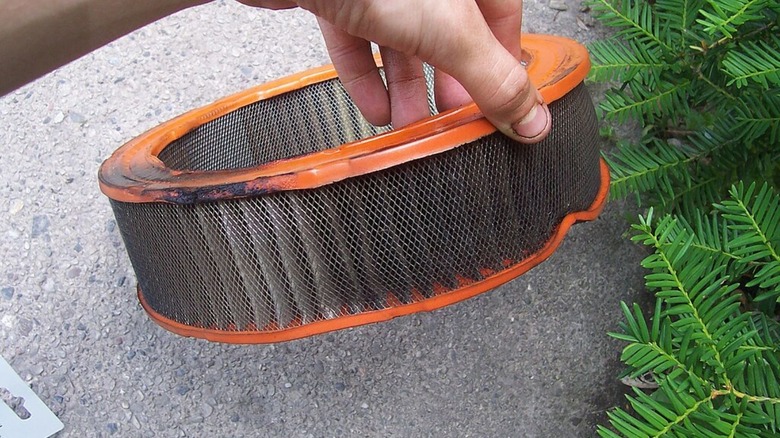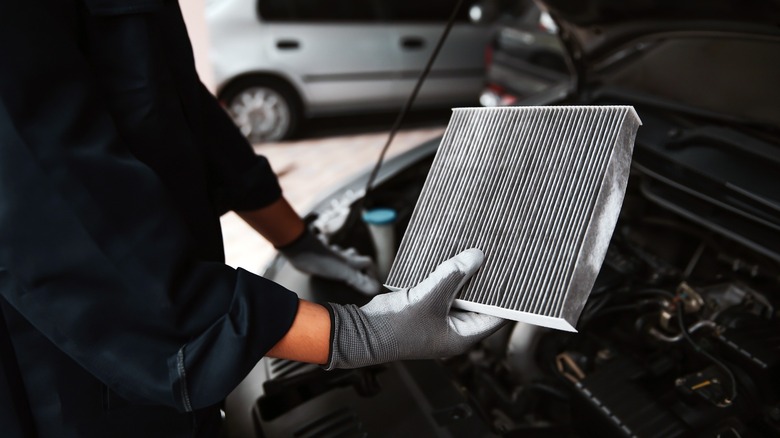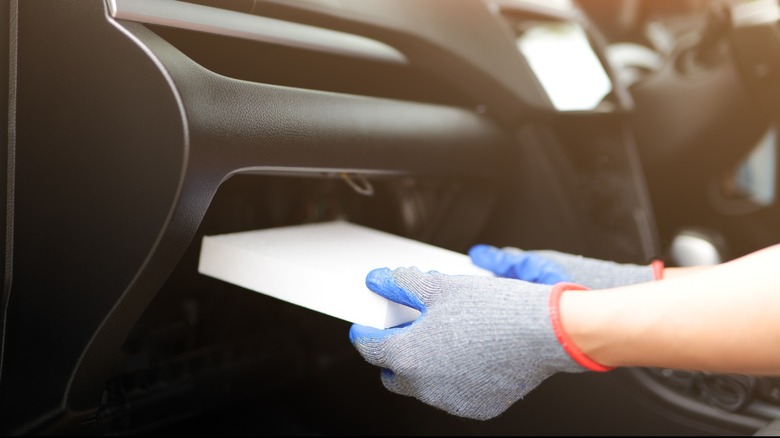Does The Engine Air Filter Affect Your Car's AC?
If you're slightly mechanically inclined or know even the most basic information about your car, you know there are two air filters to worry about. One you've probably seen every time you take your car in for an oil change. The mechanic presents a dusty, ridged filter, suggesting you replace it to maximize the airflow into your car. This one is your cabin air filter and can have a dramatic impact on the quality of your air conditioning. Alternatively, your car is also equipped with an engine air filter.
While the two may look similar, one has a much more important role to play in keeping your vehicle running optimally. A Google search may send you on a confusing spiral, as many sites use "air filter" interchangeably without indicating which they're referencing. The problem is replacing one regularly will improve your air conditioner's performance while replacing the other actually keeps your vehicle running smoothly.
Since the engine air filter prevents damaging particles from getting into your engine it has a direct impact on your vehicle's performance. If your vehicle isn't performing properly, chances are different components are being effect. Among them may be your heating and cooling. So, while your engine air filter may not immediately impact how efficiently your air conditioning runs, if ignored, a dirty filter can indirectly reduce its performance.
[Featured image by Ahanix1989 via Wikimedia Commons | Cropped and scaled | CC BY-SA 3.0]
What exactly does the engine air filter do?
Located under the hood near the front of your car's engine, tucked away in an accessible box, the engine air filter may not seem like much, but it plays a crucial role in your vehicle's performance. The filter is designed to clean the air that gets sucked into the engine via the intake manifold, which is used in the combustion process to propel your vehicle forward.
Without an engine air filter, contaminants would reach the engine and cause extensive damage. Unfiltered air can cause issues with the pistons, values, and cylinder walls of your engine, which, over time, can lead to issues with oil consumption and engine performance. If your engine isn't getting enough clean air, it can "suffocate, which reduces its power output and decreases efficiency throughout your vehicle. One of the systems bound to be effected by a dirty engine is the air conditioner.
If you drive a vehicle manufactured in the 21st century, you may notice that your air conditioning dips a little in quality during a hard acceleration. That's because many newer vehicles are equipped with a relay that kicks off the air conditioner when the throttle is wide open to ensure your engine is receiving ample power to accelerate. An engine that's poorly maintained, such as one with a dirty air filter, is less efficient and requires more power, so it's best to replace this filter every 12,000 to 15,000 miles.
Does the cabin air filter effect engine performance?
Since the engine air filter can indirectly impact your vehicle's HVAC, you may question whether the opposite is true. Can having a dirty cabin air filter cause issues in your engine? As it turns out, yes, a clogged filter may have an adverse effect on your engine. However, it's not quite as immediate as the effect a dirty engine filter can have on your cabin cooling.
When your cabin air filter is clogged, the airflow from your car's cooling system is restricted, causing a loss of airflow into your vehicle. To compensate, as the cabin won't be at the desired temperature due to the restricted airflow, the HVAC system will work harder. When your vehicle's cabin cooling has to work harder, it tries to pull more power from the engine. In a vehicle that's not properly maintained, this power requirement can result in your engine overheating, especially during the summer months when your car may already be running hot.
Thankfully, it's pretty easy to determine when your cabin air filter needs to be changed, so it should never get this bad. While you should aim to change your cabin air filter every 15,000 miles, you'll know it's due for a swap if you notice an unpleasant odor in your vehicle or start to see a buildup of dust on the dashboard.


